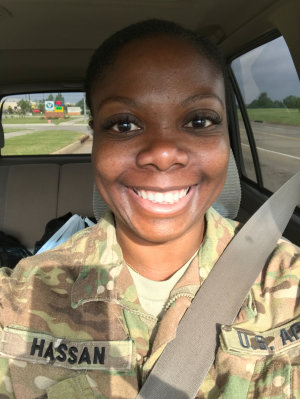By Steve Sternberg
Army surgeon Maj. Monique Hassan’s life was an adventure. All that was missing was the surgery.
MAJ. MONIQUE HASSAN’S stint as an Army surgeon was a halting journey of idle deployments, operating once or twice a month, to a solo assignment performing weight-loss operations in a base hospital without adequate back-up.
At her busiest, starting a weight-loss surgery program at Fort Sill, Oklahoma, “I was one surgeon, by myself,” Hassan says.
Hassan’s experience is typical of many military surgeons. Interviews with a dozen active-duty and retired Army, Navy and Air Force surgeons touched many similar themes, from dedication to their profession to their willingness to operate in conflict zones with only the instruments they can pack in a rucksack. But they also report feeling trapped within a system that lacks sufficient need for their services because patients are mostly young and fit and rarely need surgery.
“I think most surgeons tend to be hard-driving people who want to operate. There’s lot of frustration. The people who are really, really good will sometimes get out,” says Dr. Scott Steele, chairman of colorectal surgery at the Cleveland Clinic, a West Point Graduate former Army surgeon and Bronze star recipient with more than two decades of service including deployments in Afghanistan and Iraq.
Steele says that he left the military three years short of retirement, when he could have qualified for lifetime retirement benefits. He was tired of long deployments and, in general, lower than desired surgical caseloads. “I just couldn’t do it anymore,” he says.
Hassan, 40, lasted just over a decade. She left the service last year, frustrated with her inability to practice her profession with the same intensity as civilian surgeons and fearful that she would have a difficult time building a surgical career after her Army service was over.
“I could have done general surgery, just lumps and bumps, for the rest of my life without any problems,” she says. “But I wanted to be a well-rounded surgeon and take on more complex procedures.”
Hassan grew up in Middletown, New York, 30 miles from the United States Military Academy at West Point. When she enlisted in the Army in 2006, she knew she wanted to be a surgeon. She attended George Washington University Medical School in Washington, D.C., on a military health professions scholarship.
Hassan completed her general surgery residency at Madigan Army Medical Center in Tacoma, Washington, one of the biggest military hospitals on the West Coast. At Madigan, she was introduced to battlefield surgery, where she learned to trust her judgment and operate in the most austere settings, without X-rays and other technologies that hospital-based surgeons take for granted. She also discovered bariatric weight-loss surgery.
Bariatric surgery is one of the most common operations offered in military hospitals, providing surgeons with an opportunity to use their skills and patients with a demonstrated health benefit. It is more commonly performed on dependents of active-duty personnel than on troops who must stay fit to serve. Hassan liked the challenge of operating through small incisions, using laparoscopic tools that are a miniature extension of the surgeon’s hands.
When she graduated in 2012, Hassan says, she was “ready to take on everything.” Then she collided with the reality of military medicine.
“It’s really hard when you get placed at Fort Wainwright, Alaska, with two or three other surgeons,” she says. “We were all relatively new. You want to do a range of surgeries, but you can’t, due to limitations of the hospital.
“It’s like getting benched,” she says. “You’re ready to play and you get benched for nine months.”
The newly minted surgeon had hoped to set up a bariatric surgery program at Fort Wainwright, but within three months she was deployed to Afghanistan, where she did one or two operations per month.
“I did zero bariatric surgery,” she says.
From Afghanistan, Hassan was assigned to Reynolds Army Community Hospital in Fort Sill, Oklahoma, a struggling facility that was trying to pull in more patients. The intensive-care unit had already closed; within 18 months, the emergency room would close too. When she arrived, Hassan says, the hospital’s commander welcomed the prospect of starting something new.
Hassan proposed opening a bariatric surgery service. As soon as her plan was approved, she ordered instruments and began training nurses on how to care for patients on the wards. “You have to train everybody who hasn’t seen a bariatric patient before,” she says.
When the weight-loss surgery program opened its doors, the rush was on. “It’s overwhelming how many people you get,” she says. “We didn’t have a psychologist on post or anybody who was able to see patients with obesity; we had to farm that out to the community. We didn’t have a program coordinator – that was me, making sure they had all their [medical] clearances.”
Hassan decided to take on only simpler cases. Fresh from Afghanistan, she was out of practice. She also fretted about what might happen if a patient developed complications. The closest intensive care unit was now an hour and a half away, in Oklahoma City.
Inevitably, Hassan says, something did go wrong, without warning. Ten days after surgery, a patient’s gastric sleeve began to leak. The patient, who had been discharged from the hospital, called Hassan in alarm. Fortunately, the hospital still had an emergency room. Hassan realized the patient needed a stent, a spring-like contraption that could be slipped inside the sleeve in her stomach to seal the leak. Reynolds had no gastroenterologist on staff to insert the device. Hassan picked up the phone and started calling around, trying to find someone who could do the procedure. “It’s pretty stressful,” she says, “trying to find one person in an 80-mile radius who can help your patient.”
Ultimately, she located a specialist in Oklahoma City, and transferred the patient to his care. He was able to seal the leak and the patient recovered.
Within eight months, Hassan was deployed again, this time for six months to Kuwait and Iraq. A third deployment – this time to a classified location – would follow. “The moment you start getting your surgical volume up and going, you’re deployed again,” she says. She continued performing the weight-loss operations between her deployments, at one point leaving a physician’s assistant in charge of listing candidates for surgery and carrying out patient information sessions while she was away.
But Hassan started asking herself, “How many times can I start my career over? I deploy and then come back. It’s frustrating to start over every single time.”
When Hassan finished her second deployment, she was two years from completing her military commitment. She began applying for specialized bariatric surgery fellowships to begin when her Army career ended.
She left the Army on June, 30, 2017, just after her third deployment ended, her obligation satisfied. Today, she is immersed in a year-long bariatric surgery fellowship at the Cleveland Clinic, one of the highest-volume bariatric programs in the world.
At Fort Sill, Hassan did fewer than 20 bariatric procedures per year from to 2013 to 2016, when she did just nine, according to a U.S. News analysis of military hospital surgery data. She now averages four or five cases a week, more than 200 per year – nearly the total of 245 done at San Antonio Military Medical Center in 2016.
And, to patients seeking bariatric surgery, she offers this advice:
“You’re going to want to go to someone who does more than 10 a month. I would personally want to go to someone who is a high-volume surgeon. I know what can go wrong with bariatric surgery if it’s not done well.”

